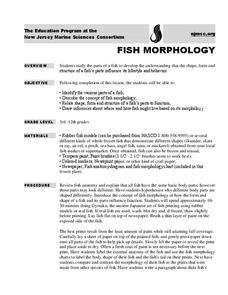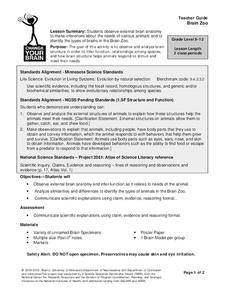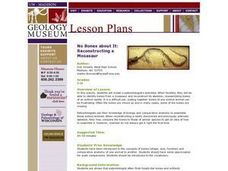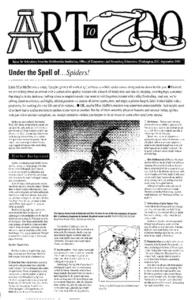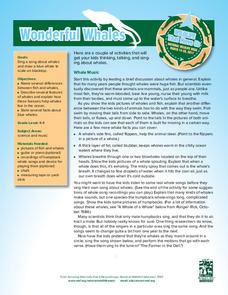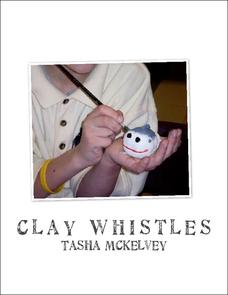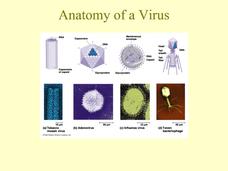Teach Engineering
Abdominal Cavity and Laparoscopic Surgery
Get to know the human body from the inside out. The first lesson plan in a series of 10 introduces the class to the abdominopelvic cavity. Biomedical engineers need to understand the region of the body as they develop and improve...
Consortium for Ocean Science Exploration and Engagement (COSEE)
Fish Morphology
Life comes in all different shapes and sizes, and fish are no exception. Here, young scientists create fish prints as they learn how specific characteristics allow different species to survive in their particular habitats.
University of Minnesota
Brain Zoo
Who doesn't love a day at the zoo? Use an observation and inference lab to get young anatomists to recognize similarities between mammalian species based on brain structures. You provide the brains; this lesson provides set-up...
National Science Teachers Association
Hop into Action
Young scientists find out what makes amphibians such unique and interesting animals in this simple life science lesson. After looking at pictures and discussing the characteristics of amphibians, learners complete a series of three Venn...
Curated OER
Bird Brained?
Students identify general abilities that indicate animal cognitive intelligence. In this biology lesson plan, students create an intelligence testing challenge for ravens. They compare its ability to that of a crow.
Curated OER
Build a Polyp
Students research coral polyps. In this coral polyps lesson, students discover the anatomy of a coral polyp and how they feed. Students create an edible coral polyp model.
Curated OER
Examining and Discussing the Mechanics of Horse Evaluation
Via teacher-led discussion, agriculture classes discover the desirable characteristics of horse anatomy. The PowerPoint and worksheet mentioned in this plan are not available; however you may find the notes useful as a guide to the...
Curated OER
Anatomy of a Kick
Young scholars investigate the muscle system operating in the kick of a ball. The order in which the six muscle groups contract is noted as the movement is produced by the contraction of opposing muscles required to move a limb in...
Curated OER
Animal Issues: Let's Talk Turkey
Thanksgiving means an untimely demise for thousands of turkeys every year. This turkey Q and A provides nine questions bringing facts and statistics of turkey consumption to the discussion table. There is an answer key that provides full...
California Academy of Science
Fish Prints
What do a dead fish, conservation, and paint have in common? The answer is a great instructional activity about fish anatomy, fun print making techniques, and unsustainable fishing practices. The class will start by making fish prints...
Curated OER
No bones About It -A Mosasaur
Students model a paleontologist's activities. They identify dinosaur bones and reassemble them into a skeleton of an extinct reptile.
Curated OER
Under the Spell of Spiders!
Young scholars read about spider body parts, abilities, tendencies, and life cycles. In this Under the Spell of Spiders! instructional activity, students create mystery creatures that turn out to be spiders. Young scholars catch and...
Curated OER
21st Century Medicine: Nerves of Steel
Students model a sarcomere's action, they gain a kinesthetic and visual understanding of muscle contraction. They use this exercise stimulates the production of myosin and actin. Students use two colors of clay, make a "sandwich" of...
Curated OER
Whose Brain is THAT?!
Students explore various animal brains. In this animal anatomy lesson plan, students compare and contrast animal brains with the brain of a human. They record several characteristics in a data table for each brain they observe.
Curated OER
Wonderful Whales
Primary marine biologists consider the largest living animals on Earth, the whales. Introduce them to general anatomy, unique adaptations, and behaviors. Teach them to sing a song that will help them remember some of these facts....
Virginia Department of Education
Adaptation and Evolution
Um may be the atomic symbol for confusion, but it won't be needed in this lesson. Scholars rotate through seven stations completing experiments, hands-on activities, writing exercises, and analysis. Stations include material on...
Tasha McKelvey
Clay Whistles
Create clay whistles with your elementary or middle school students. The project is outlined in great detail here, complete with step-by-step photographs, finished examples, a materials list, student handouts, and a rubric. Students...
Curated OER
The Envelope Please
Young scholars examine and research the importance and functions of the skeletal system in vertebrates. They construct a 10-foot geodesic dome to illustrate the importance of architectural frameworks and create a clay animation movie.
Curated OER
What Can a Leaf Be?
Students identify leaves for an art project and create a collage. In this leaf lesson, students review leaf characteristics. Students use leaves to create a collage of an animal or creature. Students write recipes of leaves for their...
Curated OER
Body Exercises: Galaxy 3
In this animal body parts worksheet, learners label the animals, complete sentences, complete a word search, and more. Students complete 4 activities.
Curated OER
Anatomy of a Virus
This PowerPoint summarizes details about the virus from the structure and reproduction methods to the different modes of infection. Various viral diseases of animals and plants, viroids, prions and genetic origins of viruses are discussed.
Curated OER
Studying Fossils: Dinosaur Tracks From Stride to leg Length to Speed
Students explore dinosaurs. Students determine the relationship between leg length, stride length, and speed in humans and bipedal dinosaurs. Students analyze collected information. Based upon the data, dinosaur tracks, and fossils,...
Curated OER
Bird Beak Anatomy
Third graders participate in an activity to determine which tool will work the best to gather food. They create analogies about how the experiment relates to birds. They brainstorm about which adaptation helps or hurts the survival of an...
Curated OER
Dissecting Squid
Second graders explore biology by dissecting an animal. In this squid anatomy lesson, 2nd graders collaborate in pairs to investigate the inner body systems of a recently deceased squid. Students utilize plastic knives to cut the squid...



